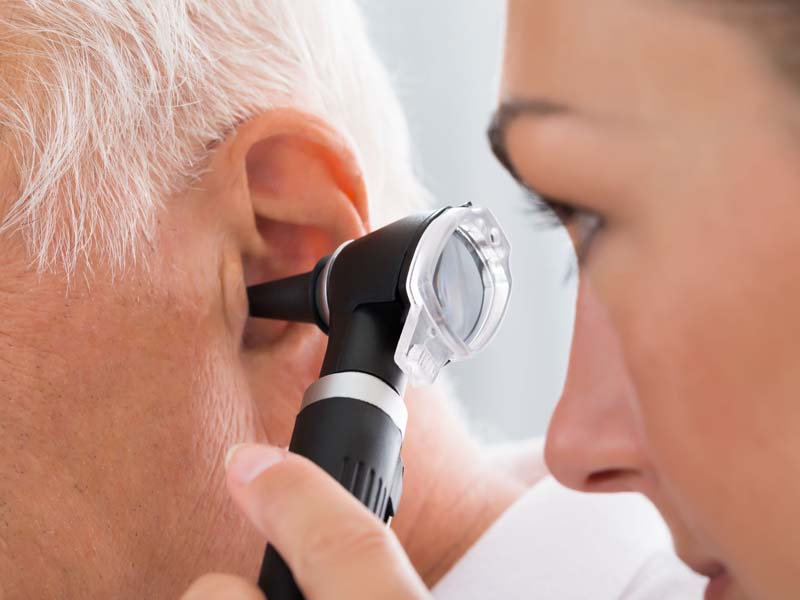USPSTF Draft Recommendation
Evidence Lacking on Screening Older Adults for Hearing Loss
September 16, 2020, 2:29 pm News Staff -- On Sept. 8, the U.S. Preventive Services Task Force posted a draft recommendation statement and draft evidence review on screening for hearing loss in older adults.

The task force has concluded that current evidence is insufficient to balance the benefits and harms of screening for hearing loss in this population. This is an "I" recommendation.
The recommendation applies to asymptomatic adults 50 or older with age-related hearing loss. It does not apply to adults with conductive, congenital or sudden hearing loss, hearing loss caused by recent noise exposure, or individuals reporting signs or symptoms of hearing loss.
"Increasing age is the most important risk factor for hearing loss," said Chien-Wen Tseng, M.D., M.P.H., M.S.E.E., associate research director in the Department of Family Medicine and Community Health at the University of Hawaii John A. Burns School of Medicine and a member of the task force, in a news release. "Although we found that screening tests can detect hearing loss, we don't have clear evidence about whether or not it's helpful to identify hearing loss in people who have not reported hearing issues."
According to the National Institute on Deafness and Other Communication Disorders, age-related hearing loss is one of the most common conditions that affects older adults. Nearly one-third of all adults ages 65-74 and about half of adults 75 and older experience some degree of hearing loss. The NIDCD recommends that individuals who think they have hearing loss consult a primary care physician, an otolaryngologist or an audiologist.
Story Highlights
Update of Existing Recommendation
With only minor changes in wording, the current draft recommendation statement is consistent with the USPSTF's 2012 statement on the topic, which also concluded that evidence was insufficient to assess the balance of benefits and harms of screening for hearing loss in asymptomatic adults 50 or older. The Academy supported the task force's 2012 recommendation.
To update its previous recommendation, the USPSTF commissioned a systematic review of evidence on the benefits and harms of screening for hearing loss in adults 50 years and older, the accuracy of screening tools, and the benefits and harms of interventions for screen-detected or recently diagnosed hearing loss. The systematic review included 40 studies and was similar in scope to the review for 2012.
Although the new review found evidence that several types of screening instruments (i.e., clinical tests, screening questionnaires and portable audiometric devices) can reasonably identify older adults who have moderate hearing loss, there was inadequate evidence to show that health outcomes were improved by screening for hearing loss in asymptomatic patients or by conducting interventions to treat hearing loss in screen-detected patients. In addition, there was inadequate evidence to determine the harms of screening and treating hearing loss.
The task force also highlighted several research gaps that need to be addressed. These include a need for screening trials that focus on health outcomes and enroll asymptomatic older adults from a general primary care population, as well as studies on potential harms associated with screening. The task force also called for trials that use consistent definitions of hearing loss to help clarify the accuracy of relevant screening tests, and trials of screening and treatment options that better reflect current technologies and treatment standards.
"We need more research to fully evaluate the benefits and harms of screening for hearing loss in people who don't have any concerns about their hearing," noted task force member John Epling, M.D., M.S.Ed., a professor of family and community medicine, medical director of research, and medical director of employee health and wellness in the Department of Family and Community Medicine at the Virginia Tech Carilion School of Medicine. "In particular, we need more studies that include the general adult population."
Up Next
The USPSTF is accepting comments on the draft recommendation statement and draft evidence review until 11:59 p.m. ET on Oct. 5. All comments received will be considered as the task force prepares its final recommendation.
The AAFP will review the USPSTF's draft recommendation statement and supporting evidence and will provide comments to the task force. The Academy will release its own recommendation on the topic after the task force finalizes its guidance.